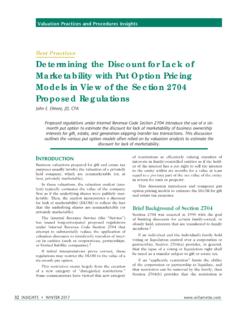Transcription of AND AN OVERVIEW OF THE ISRAELI COMPANIES LAW AS TO ...
1 A PRACTICAL GUIDE AND AN OVERVIEW OF THE ISRAELI COMPANIES LAW AS TO privately held COMPANIES1 The following article is intended to provide a practical guide and an OVERVIEW to the ISRAELI COMPANIES Law, 1999 as it relates to the establishment and governance of limited liability COMPANIES . A. Background: In the period preceding the declaration of the independence of the State of Israel (in 1948), the territory was governed by the British Mandate, hence a strong British, common law influence was manifest in the laws relating to COMPANIES in Israel. The COMPANIES law underwent a major overhaul in 1999 with the adoption of the COMPANIES Law-1999 (the " COMPANIES Law"), which adopted many new approaches into the Law bringing the law closer to the Delaware law of corporations. Some of these changes were accepted with favor by the legal and business communities and some of which, as shall be detailed below, came under sever criticism and were later amended.
2 Registration of privately held COMPANIES , and supervision over the conduct of their affairs, fall under the responsibility of the office of the COMPANIES Registrar which is a sub-division of the Ministry of Justice. 1 Written by Adv. Meir A. Fuchs, admitted to practice in Israel and the State of New York, Partner, Gideon Koren & Co. - Areas of specialty corporate law, hi-tech, life sciences. This Article is updated as of February, 2010. Meir Fuchs, Adv. February 2010. Note: The above should not be considered as legal advice, and can not be relied upon as such. 2B. Establishment of a Limited Liability Company: A limited liability company is established by one or more promoters who are required to sign and file the following forms: 1. Required Filing Information: An application for the establishment of a new corporation shall include information regarding the names, addresses and identification numbers of the applicant/s; information as to what shall be the registered office of the Company; a declaration that the applicant is not limited by any law (debt Execution Law, Bankruptcy Law) from establishing a company; a declaration as to the aims of the Company; the capital of the Company and the scope of liability which shall attach to its members.
3 Unlike some states in the , an ISRAELI company need not have a registered agent. Official notices to the Company need to be sent to its registered address. The fees payable for the establishment of an ISRAELI company do not depend upon its initially registered capital but are fixed today at a sum of 2,435 NIS (linked on an on-going basis to the Consumer Price Index) (approximately $650 as of the date of this article). The signature upon the documents which are filed for the establishment of a new company must be authenticated by an ISRAELI attorney, or if signed overseas, by the ISRAELI consul. The name of a company must be approved by the COMPANIES Registrar, who may reject a proposed name only on reasonable grounds (a company, or a trademark, are already registered with such name, or is very similar to such name; the name is intended to deceive the public, or is contrary to public policy, etc.)
4 2. The Articles of the Company. The COMPANIES Law allows wide latitude in the drafting of the Articles and only matters which are expressly prohibited or mandated by the COMPANIES Law need be included or omitted from the Articles. The general concept underlying the COMPANIES Law is that the Articles are a contract between the company and its shareholders and a contract amongst the shareholders. The Articles must include particulars as to the name of the Company, the aims of the company, details as to the registered and initially issued share capital and details as to the limitation of liability. The aims of the Company may be stated to be one of the following: (i) any activity permitted by law; (ii) any activity permitted by law, other than the activities set forth in its Articles; (iii) only the activities fixed in its Articles; (iv) public purposes only, and in such a case the Company may not distribute any profits.
5 The doctrine of ultra vires (beyond legal capacity) is no longer applicable in Israel. The capital of the Company may be composed of shares of a certain par value, or of shares of no par value, and of only one type of the above ( the Company may not have some shares with par value and some without). The Company may have various classes of shares, such as preferred shares ( with preferential voting, dividend and liquidation rights), management shares (which grant the right to appoint directors), etc. It is to be noted that an increase to the registered capital of a company has been recently exempted from stamp duty (1%) which used to be assessed on such increase, thus bringing about significant savings to COMPANIES . Most COMPANIES are registered with Ordinary Shares which grant their holders an equal right to cast one vote per share in any shareholder's meeting, to receive a proportionate part of any dividend which is distributed and the right to receive a proportionate share of any assets remaining upon liquidation after all debts to creditors have been satisfied.
6 There are no limitations as to the maximum holding by foreign residents of shares in an ISRAELI company (on the contrary, as shall be presented in a future article there are quite significant tax and government incentives provided for COMPANIES which have a high rate of foreign holding and which are active in one of Israel's approved development zones). If shares are issued to any foreign residents then, if the proposed shareholder is an individual, a photocopy of his passport must be filed (which may be authenticated, among other ways, by a notary qualified to practice in the country where the passport was issued or a notary qualified to practice in the country of residence of the foreign resident), and if the proposed foreign shareholder is a corporation, then its certificate of incorporation or registration must be filed, together with a certification as to its existence at such date, both authenticated in the manner fixed in the regulations and translated into Hebrew or English, which translation must be authenticated by a notary.
7 Liability of the shareholders may be limited by shares, that is to say that the liability of the shareholders shall be limited to the sum agreed to be paid by each of them in consideration for the shares issued to them by the Company, as countersigned by them in the Articles of the Company. The liability of the shareholders may also be unlimited, as is the case for example with a professional corporation of lawyers, certified public accountants, private investigators and some other types of special COMPANIES . There are no minimum equity investment requirements into an ISRAELI company. A company may decide to file specially drafted articles, or it may decide to merely provide the basic required details as set forth in Section above, and other than that adopt no other provisions as to its governance. In that case the general provisions of the COMPANIES Law, which are quite comprehensive, shall apply to the governance of the Company, until amended by the shareholders.
8 Examples of provisions which are 5commonly found in the Articles of privately held COMPANIES and which are not included in the COMPANIES Law are the granting of a right of first refusal upon the sale of shares by a shareholder, 'tag-along' and 'bring-along' rights and others. The initial Articles of a company must be filed in Hebrew, although after establishment, the COMPANIES Registrar will also accept Articles drafted in English. Unless otherwise stated in the Articles, the Articles of a Company may be amended upon a simple majority vote of the shareholders in a general shareholders assembly. The Articles may also state that certain provisions shall require a special voting majority in order to be amended. No amendment may be made to the Articles which would require a shareholder to purchase additional shares, or to increase his liability, absent his approval to such change.
9 If the capital of the company is divided into various classes, no change may be made in the Articles as to the rights of such class, without the approval of a majority of such class, unless it has been fixed otherwise in the Articles. The Articles shall be signed by the first shareholder/s and shall indicate, alongside his name, his address, identification number, and the number of shares allotted to him. The Articles must be signed before an attorney (or ISRAELI consul abroad) in order to authenticate the identity of those signing. 3. Consent of Initial Directors: A third form which must be signed and filed at the time of establishment of a new company is that of the consent to act by the initial directors. The form must include the particulars of those persons who have agreed to act as the initial directors of the Company.
10 The tenure of the initial 6directors shall end upon the closing of the first shareholders assembly, unless fixed otherwise in the Articles. A corporation may act a director, while naming the person who shall act as its representative. A privately held ISRAELI company must have at least one director. If it is desired to appoint a non- ISRAELI resident as a director in an ISRAELI company, then, if the proposed director is an individual, a photocopy of his passport must be filed (which may be authenticated, among other ways, by a notary qualified to practice in the country where the passport was issued or a notary qualified to practice in the country of residence of the foreign resident), and if the proposed directors is a corporation, then its certificate of incorporation or registration must be filed, together with a certification as to its existence at such date, both authenticated in the manner fixed in the regulations and translated into Hebrew or English, which translation must be authenticated by a notary.








